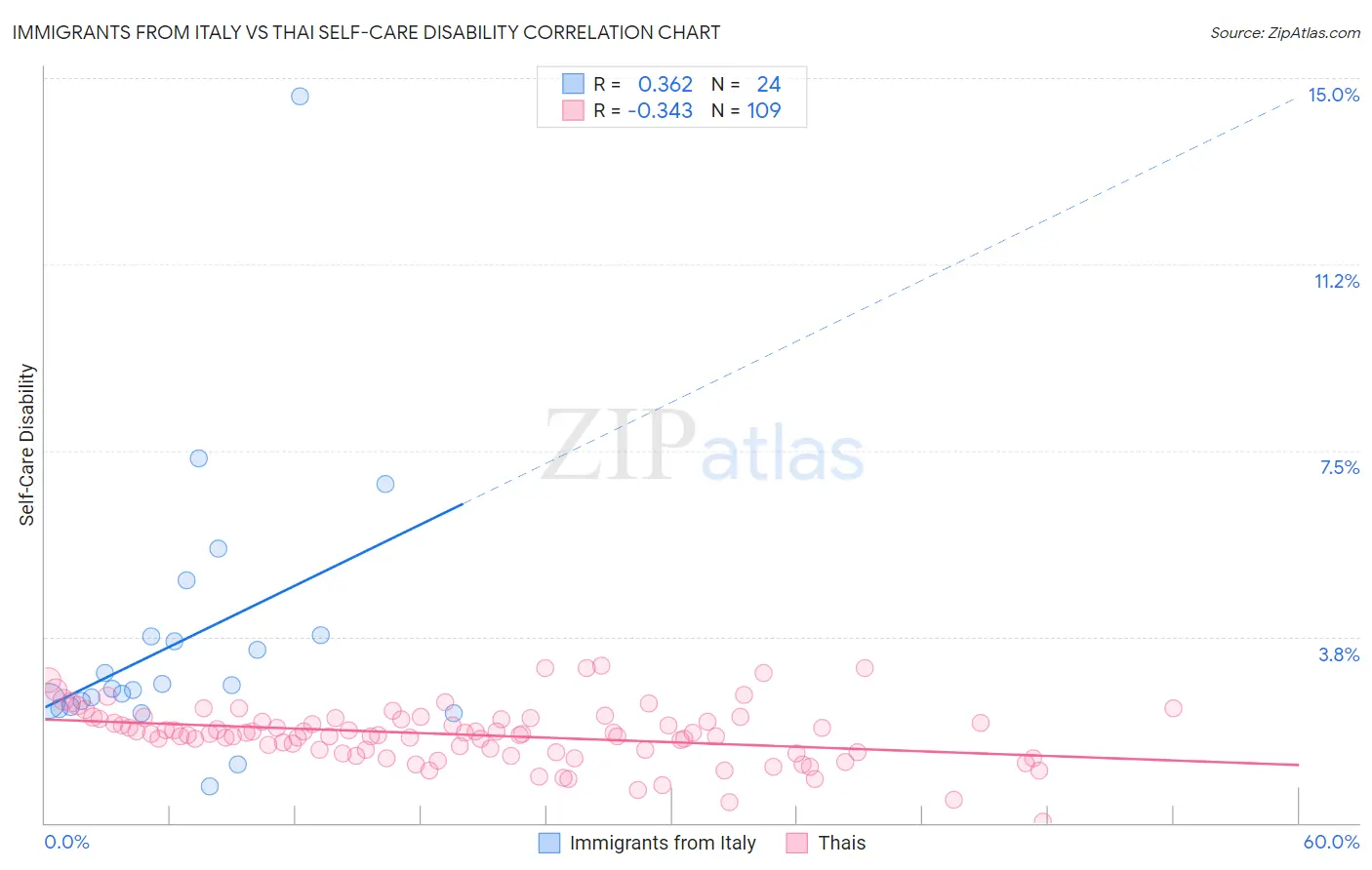Immigrants from Italy vs Thai Self-Care Disability
COMPARE
Immigrants from Italy
Thai
Self-Care Disability
Self-Care Disability Comparison
Immigrants from Italy
Thais
2.4%
SELF-CARE DISABILITY
68.5/ 100
METRIC RATING
159th/ 347
METRIC RANK
2.1%
SELF-CARE DISABILITY
100.0/ 100
METRIC RATING
3rd/ 347
METRIC RANK
Immigrants from Italy vs Thai Self-Care Disability Correlation Chart
The statistical analysis conducted on geographies consisting of 324,001,761 people shows a mild positive correlation between the proportion of Immigrants from Italy and percentage of population with self-care disability in the United States with a correlation coefficient (R) of 0.362 and weighted average of 2.4%. Similarly, the statistical analysis conducted on geographies consisting of 474,998,821 people shows a mild negative correlation between the proportion of Thais and percentage of population with self-care disability in the United States with a correlation coefficient (R) of -0.343 and weighted average of 2.1%, a difference of 17.4%.

Self-Care Disability Correlation Summary
| Measurement | Immigrants from Italy | Thai |
| Minimum | 0.74% | 0.030% |
| Maximum | 14.6% | 3.2% |
| Range | 13.9% | 3.1% |
| Mean | 3.7% | 1.8% |
| Median | 2.7% | 1.8% |
| Interquartile 25% (IQ1) | 2.4% | 1.4% |
| Interquartile 75% (IQ3) | 3.8% | 2.1% |
| Interquartile Range (IQR) | 1.4% | 0.67% |
| Standard Deviation (Sample) | 2.8% | 0.57% |
| Standard Deviation (Population) | 2.7% | 0.57% |
Similar Demographics by Self-Care Disability
Demographics Similar to Immigrants from Italy by Self-Care Disability
In terms of self-care disability, the demographic groups most similar to Immigrants from Italy are Immigrants from Western Europe (2.4%, a difference of 0.0%), Immigrants from Europe (2.4%, a difference of 0.060%), Finnish (2.4%, a difference of 0.080%), Lebanese (2.4%, a difference of 0.11%), and Nigerian (2.4%, a difference of 0.12%).
| Demographics | Rating | Rank | Self-Care Disability |
| Tlingit-Haida | 73.5 /100 | #152 | Good 2.4% |
| Immigrants | England | 73.5 /100 | #153 | Good 2.4% |
| Italians | 72.2 /100 | #154 | Good 2.4% |
| Pakistanis | 71.4 /100 | #155 | Good 2.4% |
| Nigerians | 70.6 /100 | #156 | Good 2.4% |
| Immigrants | Europe | 69.6 /100 | #157 | Good 2.4% |
| Immigrants | Western Europe | 68.6 /100 | #158 | Good 2.4% |
| Immigrants | Italy | 68.5 /100 | #159 | Good 2.4% |
| Finns | 67.0 /100 | #160 | Good 2.4% |
| Lebanese | 66.5 /100 | #161 | Good 2.4% |
| Somalis | 63.7 /100 | #162 | Good 2.5% |
| German Russians | 62.7 /100 | #163 | Good 2.5% |
| Immigrants | Vietnam | 59.3 /100 | #164 | Average 2.5% |
| Syrians | 59.0 /100 | #165 | Average 2.5% |
| Canadians | 58.8 /100 | #166 | Average 2.5% |
Demographics Similar to Thais by Self-Care Disability
In terms of self-care disability, the demographic groups most similar to Thais are Immigrants from Singapore (2.1%, a difference of 2.3%), Immigrants from India (2.0%, a difference of 3.0%), Zimbabwean (2.2%, a difference of 3.3%), Filipino (2.2%, a difference of 3.6%), and Immigrants from Bolivia (2.2%, a difference of 3.8%).
| Demographics | Rating | Rank | Self-Care Disability |
| Yup'ik | 100.0 /100 | #1 | Exceptional 1.9% |
| Immigrants | India | 100.0 /100 | #2 | Exceptional 2.0% |
| Thais | 100.0 /100 | #3 | Exceptional 2.1% |
| Immigrants | Singapore | 100.0 /100 | #4 | Exceptional 2.1% |
| Zimbabweans | 100.0 /100 | #5 | Exceptional 2.2% |
| Filipinos | 100.0 /100 | #6 | Exceptional 2.2% |
| Immigrants | Bolivia | 100.0 /100 | #7 | Exceptional 2.2% |
| Bolivians | 100.0 /100 | #8 | Exceptional 2.2% |
| Immigrants | Nepal | 100.0 /100 | #9 | Exceptional 2.2% |
| Sudanese | 100.0 /100 | #10 | Exceptional 2.2% |
| Immigrants | South Central Asia | 100.0 /100 | #11 | Exceptional 2.2% |
| Immigrants | Ethiopia | 100.0 /100 | #12 | Exceptional 2.2% |
| Ethiopians | 100.0 /100 | #13 | Exceptional 2.2% |
| Luxembourgers | 100.0 /100 | #14 | Exceptional 2.2% |
| Okinawans | 100.0 /100 | #15 | Exceptional 2.2% |